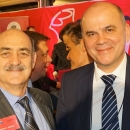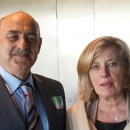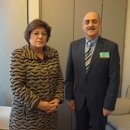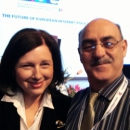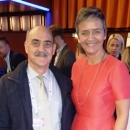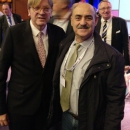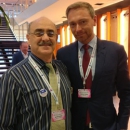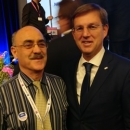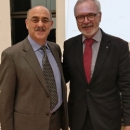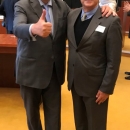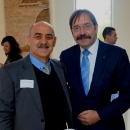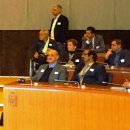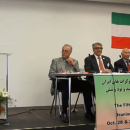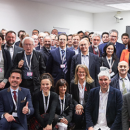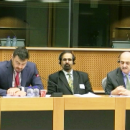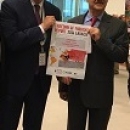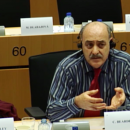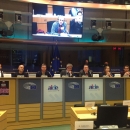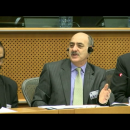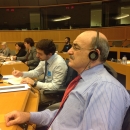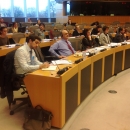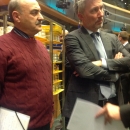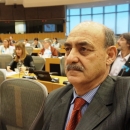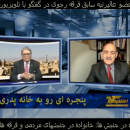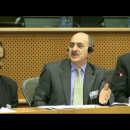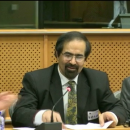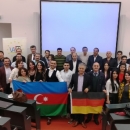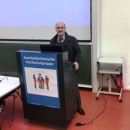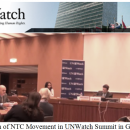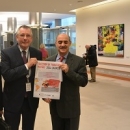“One who is wise is cautious and turns away from evil, but a fool is reckless and careless.” (Proverbs 14:16)

U.S. Secretary of State John Kerry (front, center) sits between Chinese Foreign Minister Wang Yi (left) and French Foreign Minister Laurent Fabius (right) at the United Nations Headquarters after the P5+1 nations reached an interim nuclear deal with Iran in Geneva, Switzerland, on November 24, 2013. (Photo: U.S. State Department) Read more at http://www.breakingisraelnews.com/44546/does-p51-nuclear-deal-iran-partner-middle-east/#XorwhfWgejVvgbFc.99
“One who is wise is cautious and turns away from evil, but a fool is reckless and careless.” (Proverbs 14:16)
After more than a decade of intermittent negotiations over Iran’s nuclear program, the so-called P5+1 powers—the United States, France, United Kingdom, Germany, Russia, and China—missed a June 30 deadline to finalize the Framework for a Joint Comprehensive Plan of Action that was reached in April, or in other words, a final nuclear deal with Iran. The new deadline for an agreement is July 7.
With Iranian Supreme Leader Ayatollah Ali Khamenei rejecting several key components agreed to under the framework deal, such as a long-term freeze on nuclear research, delayed lifting of international sanctions, and access by inspectors to all nuclear sites (including military ones), many observers fear that negotiators might agree to a weak deal with Iran, or that an agreement could collapse altogether.
Against that backdrop, JNS.org examines the positions of each of the P5+1 countries as they approach of the July 7 deadline.
U.S.
Since the 1979 Islamic Revolution in Iran, the U.S. has had little diplomatic contact with Iran and has maintained a serious of legal sanctions against the country, stemming from the 1979-81 Iranian hostage crisis as well as Iran’s nuclear program and government sponsorship of terrorist organizations.
Despite the decades of distance between the two countries, the U.S.—along with China and Russia—joined negotiations over Iran’s nuclear program in 2006 that were being conducted by the U.K., France, and Germany, known as the EU3. Under the new P5+1 negotiations, proposals were made to encourage Iran to halt uranium enrichment. Nevertheless, Iran rejected those proposals, leading to a series of United Nations Security Council resolutions and separate European Union (EU) and U.S. sanctions that severely curtailed the Iranian economy.
Since taking office in 2008, President Barack Obama has made solving the Iranian nuclear issue a top priority, despite deep skepticism about his approach from many members of Congress and important American allies such as Israel.
In April, Obama told the New York Times that a nuclear deal with Iran is a “once-in-a-lifetime opportunity to see whether or not we can at least take the nuclear issue off the table.” In an interview with The Atlantic’s Jeffrey Goldberg in May, Obama further staked his legacy on achieving a deal.
“Look, 20 years from now, I’m still going to be around, God willing. If Iran has a nuclear weapon, it’s my name on this,” Obama said, adding, “I think it’s fair to say that in addition to our profound national security interests, I have a personal interest in locking this down.”
But several former senior members of the Obama and George W. Bush administrations, who had all previously worked closely on the Iranian nuclear issue, wrote in a June 24 open letter to Obama expressing concern that the emerging deal with Iran “may fall short of meeting the administration’s own standard of a ‘good’ agreement.”
According to the former U.S. officials, several key components must be part of any final deal, including: monitoring and verification of all nuclear sites, including military ones; strict limits on advanced nuclear centrifuges; the lifting of sanctions only after compliance; and serious consequences for violations of the agreement by Iran.
U.S. Secretary of State John Kerry, meanwhile, recently stated that there will be no final deal if Iran does not live up to the framework agreement.
“It may be that the Iranians will not fill out the full measure of what was agreed on in Lausanne [in April], in which case there will not be an agreement,” Kerry told reporters June 24.
Obama also faces consequences from Congress if a nuclear deal is delayed or does not meet their federal legislators’ standards. According to the Iran Nuclear Review Act of 2015, Obama must submit the deal to Congress by July 9, and lawmakers would then have 30 days to review the pact. If negotiations go beyond July 9, Congress would have 60 days to review the deal—more time to potentially nix the agreement.
France
Of all the countries involved in the nuclear talks, France has taken a particularly hard line on Iran, likely due to France’s previous failed attempts to solve the Iranian nuclear issue during the EU3 (France, U.K., Germany) negotiations in the 2000s. At the time, France blamed the collapse of those talks on Iran’s concealing its secretive Fordow nuclear facility. France’s strong stance against nuclear proliferation has long been a central part of the country’s foreign policy.
When the current phase of negotiations with Iran began in 2013, France was highly critical of the process and argued that the interim nuclear deal signed in November 2013 did not go far enough in limiting Iran’s nuclear capabilities. At the time, French Foreign Minister Laurent Fabius called the negotiations a “fool’s game” that scuttled the signing of the interim deal for a few weeks.
During negotiations for the April framework deal, France was particularly adamant that world powers should not give in on several key areas, particularly on the timeline in lifting U.N. sanctions and constraining Iran’s nuclear research.
More recently, France has been intent on not allowing Iran any wiggle room in the deal, especially on international inspections at military sites.
“A robust agreement is one which includes an extensive verification element, including, if necessary, visits to military sites and automatic re-introduction of sanctions if Iran violates the accord,” Fabius said June 21, AFP reported.
Germany
Germany has been part of Iranian nuclear negotiations for more than a decade, along with France and the U.K. Unlike many Western countries, Germany has traditionally been considered one of Iran’s top business partners in the EU. Nevertheless, trade between the nations has significantly shrunk amid the EU’s imposing of tough sanctions on Iran over the last several years.
“We are in front of a decisive period. … This will be important to bring the 10-year [Iranian nuclear] conflict to an end,” German Foreign Minister Frank-Walter Steinmeier said June 22.
U.K.
The U.K. has had a back-and-forth relationship with Iran. As was the case with the U.S., the 1979 Islamic Revolution strained British-Iranian ties, with the U.K. breaking off diplomatic relations. After normalizing ties with Iran in 1998, the U.K. again closed its embassy there in 2011 when it was stormed by Iranian protesters. Bilateral relations were again restored in 2014.
The British have been signatories to the comprehensive international sanctions against Iran, but have also been strong supporters of the Obama administration’s position against increased sanctions during the current negotiations. In January, U.K. Prime Minister David Cameron personally called several key U.S. senators to urge them not to pass new sanctions against Iran.
Yet recently, the U.K. echoed France’s harder line on Iran.
“There will need to be some more flexibility shown by our Iranian partners if we are going to reach a deal,” British Foreign Secretary Philip Hammond said June 23, Reuters reported.
Russia
As one of the dominant countries in the Eurasian landmass, Russia has a centuries-long history with Iran. Modern-day relations between those countries have primarily focused on defense and energy ties, as well as their common ambition of thwarting U.S. power in the region. Russia also has deep ties with Iran’s nuclear program dating back to the 1990s, with its participation in the Bushehr nuclear power plant.

From left, Head of Mission of People’s Republic of China to the European Union Hailong Wu, French Foreign Minister Laurent Fabius, German Foreign Minister Frank-Walter Steinmeier, European Union High Representative for Foreign Affairs and Security Policy Federica Mogherini, Iranian Foreign Minister Javad Zarifat, an unidentified Russian official, British Foreign Secretary Philip Hammond, and U.S. Secretary of State John Kerry pose for a photo following negotiations between the P5+1 member nations and Iranian officials about the future of their country’s nuclear program at the École Polytechnique Fédérale de Lausanne in Switzerland on April 2, 2015. (Photo: US State Department) Read more at http://www.breakingisraelnews.com/44546/does-p51-nuclear-deal-iran-partner-middle-east/#XorwhfWgejVvgbFc.99
Following April’s framework nuclear deal, Russia announced that it was renewing the sale of the advanced S-300 missile system to Iran. That transaction was strongly opposed by the U.S. and Israel, who fear that it could neutralize a pre-emptive strike on Iran’s nuclear facilities if that becomes necessary.
Also hit by Western sanctions over its actions in Ukraine, Russia sees Iran as a golden opportunity for investors. Despite the sanctions, Iran remains one of the world’s larger economies, and there is ample potential for Russian companies to do business in Iran— especially in relation to raw-materials manufacturing and a large consumer market for Russian goods.
But a resurgent Iran may also pose a problem for Russia in the oil and gas sector by fully reintroducing Iranian oil into the world market, which could further drive down global prices for oil—a major component of the Russian economy. Russia also fears that a nuclear deal could open up friendlier relations between the U.S. and Iran.
Russian Foreign Minister Sergei Lavrov has suggested that the actual results of the nuclear talks are more important than completing the negotiations before the July 7 deadline.
“The prospects of ending the talks to resolve the Iranian nuclear program in due time should be secondary in comparison to resolving the problem itself,” Lavrov said June 19, the Sputnik News Agency reported.
China
Like Russia, China has taken a softer approach in negotiations with Iran, likely due to its close economic, trade, and energy ties with the Islamic Republic. While most of the West has restricted the sale of Iranian oil, China is currently the largest importer of Iranian crude oil as well as Iran’s third-largest supplier. Energy-hungry Beijing hopes that a nuclear deal will allow Iran to resume unrestricted oil exports.
China also has interests in deepening economic connections with Central Asia and the Middle East as part of a broader “New Silk Road Initiative.” China hopes that solving the Iranian nuclear situation will be the first step in stabilizing the Middle East.
While a deal with Iran would give an economic boost to China, the agreement would also be an opportunity for China and the U.S. to work constructively together and to possibly resolve bilateral tensions recently over China’s more assertive role in Asia.
“China and the United States, both taking on major responsibilities in safeguarding the international nuclear non-proliferation system, maintained good contact with each other during the negotiations, while instilling positive energy into bilateral relations,” Chinese Foreign Minister Wang Yi said after April’s framework deal was reached, Reuters reported.
More recently, China has attempted to quell tension between Iran and the West over details such as Iran’s refusal to grant international inspections of military sites. According to the Sputnik News Agency, Wang said that all parties in the negotiations “should not raise any new demands to prevent complicating the talks process.”

